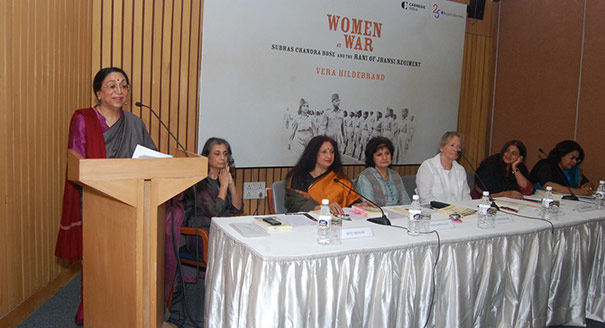Registration
You will receive an email confirming your registration.
During World War II, Subhas Chandra Bose raised perhaps the first female infantry fighting unit in military history, the Rani of Jhansi Regiment (RJR). These women soldiers—of varying class, caste, faith, and age—were recruited from the Indian diaspora in Singapore, Malaysia, and Myanmar, and most had never received any prior military training. In the decades since, both their service, which has been surrounded by many myths, and the role played by Bose have been largely unexplored. Vera Hildebrand’s book Women at War: Subhas Chandra Bose and the Rani of Jhansi Regiment traces, through in-depth interviews and meticulous archival research, how Bose set up the RJR, the experience of the Ranis, and their place in Indian and world history.
Carnegie India, in partnership with HarperCollins, the India International Centre and Women in Security, Conflict Management and Peace (WISCOMP), hosted a discussion of Dr. Vera Hildebrand’s book. The discussion was chaired by Rita Manchanda, research director at the South Asia Forum for Human Rights. She was joined by Dr. Babli Moitra Saraf, principal of the Indraprastha College for Women; Ritu Menon, founder of Women Unlimited; Sagari Chhabra, an award-winning author, poet, playwright, and film director; and Dr. Ujjayini Ray, associate professor in the department of history at the Lady Shri Ram College for Women.
DISCUSSION HIGHLIGHTS
- Myths About the RJR: Discussants emphasized the importance of challenging the tendency to mythologize the freedom fighter Subhas Chandra Bose and the RJR, and noted that the book brings out the complex relationship between Bose and the women who joined the regiment. The book, they said, raises the critical question of what Bose’s intentions were in raising the RJR. Were they to be martyrs, given their relative lack of expertise, or was the image of female soldiers fighting for Indian freedom meant to demoralize the largely male soldiers of the British Indian army? One participant argued in favour of the latter, asserting that the RJR was a psychological operation.
- Deconstructing the Ranis: The discussants questioned whether the Ranis joined the RJR because they were in full agreement with Bose’s brand of militant nationalism, or because that militant nationalism was the only strand of the Indian national movement that spread to Southeast Asia, where the RJR volunteers were from. They noted that most of the women recruits were driven by nationalist sentiments, along with a certain hero worship and idolization of Bose. However, given that a large proportion of the over four hundred Ranis were barely adults, with some as young as twelve years old, the discussants were quick to point out that the Ranis were at an impressionable age.
- RJR’s Importance: The discussants agreed that women’s non-combative contribution towards war efforts needs to be highlighted. The RJR needs to be recognized as a distinct force of independence in itself. By extending the frontiers of research on women freedom fighters, they argued that the book highlights the issue of whose contribution is remembered and whose is forgotten. For example, they said, why were the Ranis never celebrated in free India, and why did the Ranis that stayed back in Southeast Asia not receive any pensions? The book also raises the question of where the Ranis should be placed in the larger women’s rights movement in India, participants added. Its recruits were brave women who broke countless taboos and were far ahead of their time. However, the discussants noted the silence of the Ranis themselves after their dispersal. One of the reasons, speakers suggested, was that despite having broken several stereotypes, little had changed in the society they returned to, where some individuals respected them less for having spent two years in the jungle with men, as part of the Indian National Army.
This summary was prepared by Sharanya Rajiv, an intern at Carnegie India.
Vera Hildebrand
Vera Hildebrand has a doctorate in Indian history and culture from Georgetown University. She is a senior research fellow at the Nordic Institute of Asian Studies at University of Copenhagen, Denmark. Previously, she taught at Harvard University.
Sagari Chhabra
Sagari Chhabra is an award-winning author, poet, playwright, and film director. Her latest book In Search of Freedom has been awarded the National Laadli Media award. She has written and directed fifteen films, which have won five awards. She is responsible for creating the region’s first multi-media archive of surviving freedom fighters across India, Malaysia, Singapore, Thailand, and Myanmar.
Rita Manchanda
Rita Manchanda is director of research at the South Asia Forum for Human Rights.
Ritu Menon
Ritu Menon is founder of Women Unlimited and co-founder of Kali for Women, India’s oldest feminist publisher.
Ujjayini Ray
Ujjayini Ray is an associate professor in the department of History, Lady Shri Ram College for Women.
Babli Moitra Saraf
Babli Moitra Saraf is principal of Indraprastha College for Women and an expert in literatures in English.
